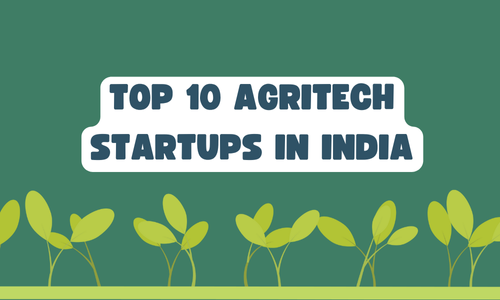India, known for its rich agricultural heritage, is experiencing a significant transformation with the advent of agritech startups leveraging cutting-edge technologies to revolutionize farming practices. These startups are not only enhancing productivity but also focusing on sustainability and improving farmers’ livelihoods. Here’s an in-depth look at the top 10 agritech startups in India leading this revolution:
1. Netafim

Description: Netafim India, a subsidiary of the global leader in drip irrigation solutions, focuses on precision irrigation systems. Their technology optimizes water and nutrient delivery to crops, significantly improving water use efficiency and crop yields.
| Key Metrics | Details |
|---|---|
| Year Founded | 1997 |
| Founder(s) | Founded by Simcha Blass |
| Headquarters | Pune, India |
| Funding Status | Acquired by Mexichem in 2017 |
Summary: Netafim’s advanced irrigation solutions are instrumental in conserving water and enhancing agricultural productivity across India.
2. CropIn

Description: CropIn Technology offers AI and data-driven solutions to digitize farm management. Their platform provides real-time insights on crops, weather forecasts, pest predictions, and market trends, empowering farmers to make informed decisions.
| Key Metrics | Details |
|---|---|
| Year Founded | 2010 |
| Founder(s) | Krishna Kumar |
| Headquarters | Bengaluru, India |
| Funding Status | Series B funding in 2020 |
Summary: CropIn is transforming agriculture by enabling farmers to adopt precision farming techniques through data-driven insights.
3. DeHaat

Description: DeHaat integrates technology with agri-inputs and market linkages to offer end-to-end agricultural services to farmers. They provide access to quality inputs, advisory services, and market linkages through a mobile platform.
| Key Metrics | Details |
|---|---|
| Year Founded | 2012 |
| Founder(s) | Shashank Kumar, Manish Kumar |
| Headquarters | Patna, India |
| Funding Status | Series C funding in 2021 |
Summary: DeHaat is empowering rural farmers by providing personalized agricultural solutions and improving their incomes.
4. AgroStar

Description: AgroStar operates an online platform offering farmers access to quality agri-inputs, crop advisory services, and market linkages. Their mobile app delivers personalized agronomic advice and facilitates direct purchases.
| Key Metrics | Details |
|---|---|
| Year Founded | 2013 |
| Founder(s) | Shardul Sheth, Sitanshu Sheth |
| Headquarters | Pune, India |
| Funding Status | Series D funding in 2020 |
Summary: AgroStar’s digital platform enhances agricultural efficiency by providing farmers with timely information and access to essential inputs.
5. Ninjacart

Description: Ninjacart operates a B2B fresh produce supply chain platform connecting farmers directly with retailers and businesses. Their technology-driven logistics network ensures efficient delivery of perishable goods.
| Key Metrics | Details |
|---|---|
| Year Founded | 2015 |
| Founder(s) | Thirukumaran Nagarajan |
| Headquarters | Bengaluru, India |
| Funding Status | Series E funding in 2021 |
Summary: Ninjacart streamlines the agricultural supply chain, reducing post-harvest losses and improving farmers’ profitability.
6. Stellapps

Description: Stellapps offers end-to-end dairy technology solutions leveraging IoT and data analytics. Their platform, ‘SmartMoo’, enables dairy farmers to monitor cattle health, milk quality, and productivity.
| Key Metrics | Details |
|---|---|
| Year Founded | 2011 |
| Founder(s) | Ranjith Mukundan |
| Headquarters | Bengaluru, India |
| Funding Status | Series B funding in 2020 |
Summary: Stellapps is revolutionizing the dairy sector by improving milk production efficiencies and ensuring dairy herd management.
7. WayCool Foods

Description: WayCool Foods integrates technology into the agricultural supply chain to ensure farm-fresh produce reaches consumers efficiently. They focus on reducing wastage and improving income for farmers.
| Key Metrics | Details |
|---|---|
| Year Founded | 2015 |
| Founder(s) | Karthik Jayaraman |
| Headquarters | Chennai, India |
| Funding Status | Series C funding in 2021 |
Summary: WayCool Foods is bridging the gap between farmers and consumers through technology-driven supply chain solutions.
8. Aibono

Description: Aibono utilizes AI and machine learning to optimize farming practices and increase crop yields. Their platform provides farmers with predictive analytics and farming intelligence for sustainable agriculture.
| Key Metrics | Details |
|---|---|
| Year Founded | 2014 |
| Founder(s) | Vivek Rajkumar |
| Headquarters | Chennai, India |
| Funding Status | Series A funding in 2021 |
Summary: Aibono empowers farmers with data-driven insights to enhance productivity and promote sustainable farming practices.
9. Intello Labs

Description: Intello Labs specializes in computer vision and AI-based solutions for grading and quality assessment of agricultural produce. Their technology ensures standardization and quality control in food supply chains.
| Key Metrics | Details |
|---|---|
| Year Founded | 2016 |
| Founder(s) | Milan Sharma, Nishant Mishra |
| Headquarters | Gurugram, India |
| Funding Status | Series A funding in 2020 |
Summary: Intello Labs is enhancing transparency and efficiency in food quality assessment through advanced AI solutions.
10. RML AgTech

Description: RML AgTech provides precision agriculture solutions through its ‘FarmERP’ platform, integrating IoT, GIS, and AI technologies. They offer farm management software to optimize resource use and improve crop yields.
| Key Metrics | Details |
|---|---|
| Year Founded | 2012 |
| Founder(s) | Amit Mehra |
| Headquarters | Pune, India |
| Funding Status | Series B funding in 2019 |
Summary: RML AgTech is empowering farmers with advanced technology tools to make informed decisions and enhance agricultural productivity.
FAQs about agritech startups in India along with their answers:
Q1: What are agritech startups?
A: Agritech startups are companies that use technology innovations such as AI, IoT, and data analytics to address challenges in agriculture. They focus on improving productivity, efficiency, and sustainability in farming practices.
Q2: How are agritech startups transforming agriculture in India?
A: Agritech startups in India are introducing solutions like precision farming techniques, digital platforms for farm management, supply chain optimization, and quality assessment technologies. These innovations help farmers make data-driven decisions, reduce wastage, and improve crop yields.
Q3: What types of technologies do agritech startups in India use?
A: Agritech startups utilize a range of technologies including AI (Artificial Intelligence), IoT (Internet of Things), machine learning, blockchain, and data analytics. These technologies enable them to offer smart farming solutions, predictive analytics, and remote monitoring of crops and livestock.
Q4: How do agritech startups benefit farmers?
A: Agritech startups benefit farmers by providing access to quality agri-inputs, real-time market information, personalized advisory services, and improved logistics for their produce. This leads to higher yields, reduced costs, increased income, and better overall farm management.
Q5: What are some challenges faced by agritech startups in India?
A: Challenges faced by agritech startups include infrastructure limitations in rural areas, adoption barriers among traditional farmers, data privacy concerns, regulatory complexities, and the need for continuous innovation to stay competitive.
Q6: How can farmers access services provided by agritech startups?
A: Farmers can access agritech startup services through mobile apps, online platforms, and local distribution networks. These platforms provide farmers with information on weather forecasts, crop health, pest management, market prices, and direct purchasing of agri-inputs.
Q7: Are agritech startups financially viable for small-scale farmers?
A: Yes, many agritech startups offer scalable solutions that cater to small-scale farmers by providing cost-effective technologies, affordable financing options, and support services tailored to their needs. This helps in improving profitability and sustainability for smallholder farmers.
Q8: How can agritech startups contribute to sustainable agriculture?
A: Agritech startups contribute to sustainable agriculture by promoting efficient use of resources such as water and fertilizers, reducing carbon footprint through precision farming techniques, minimizing food waste in supply chains, and fostering environmentally-friendly practices among farmers.
Q9: What role do agritech startups play in the global food security landscape?
A: Agritech startups play a crucial role in enhancing global food security by improving agricultural productivity, ensuring food traceability and safety, facilitating resilient farming practices against climate change impacts, and connecting farmers with global markets.
Q10: How can stakeholders support the growth of agritech startups in India?
A: Stakeholders including government bodies, investors, research institutions, and agricultural associations can support agritech startups through policy reforms, funding opportunities, research collaborations, infrastructure development, and promoting awareness about innovative farming technologies.
Conclusion
These top 10 agritech startups in India exemplify the transformative impact of technology on agriculture. From precision irrigation and farm management platforms to supply chain optimization and quality assessment solutions, these startups are redefining farming practices, improving efficiencies, and ensuring sustainable agricultural development. As they continue to innovate and scale their operations, these startups are poised to play a crucial role in shaping the future of agriculture in India and beyond.


